The ugly truth behind the agro-industry, what you eat and what it does to Europe and South America.
 This reader you find in attachment focuses on the implications of the ever-growing production and consumption of meat. We follow a pig from the industrialized European farm all the way back to the soy fields in South America where the feed is produced. The journey examines the various problems in the agricultural sector, exposing the underlying structures and the role of international policies.
This reader you find in attachment focuses on the implications of the ever-growing production and consumption of meat. We follow a pig from the industrialized European farm all the way back to the soy fields in South America where the feed is produced. The journey examines the various problems in the agricultural sector, exposing the underlying structures and the role of international policies.
Global food production and especially the production of meat has increased dramatically ain the past decades. As living standards rise, we eat more and we eat more meat. Meat production today is an intensive industry taking animal feed from one part of the world to overproduce meat under extreme conditions in another.
It is an industry that comes with unacceptable consequences for animals, humans and the environment; it pollutes our waters, lands and air; it speeds up deforestation and climate change and it treats humans and animals, not as living beings deserving respect but as means to gain profit.
The effects of the increasingly intensive meat production can be seen worldwide. Small diverse farms are replaced with enormous monoculture farms and factories, specialised in producing for export. This has a particular impact on the poor, who are more directly reliant on their land for food, health care and income. The competition for arable land between small family farmers, large landowners and the agro-industry's profit-seeking corporations raises important questions about who should have ownership of the land, who should be entitled to use its resources and who should reap the benefits from it. Is it acceptable to prioritise economic growth before the right to food?
Animals are no better off. Wild animals are threatened to extinction due to deforestation and pollution and farm animals are reduced to meat factories. Raped of all dignity as living beings, animals are kept under extreme conditions in closed factories, pumped with antibiotics and sedatives against diseases and stress. Vegetarians and vegans take a stand against this. Consuming meat and other animal products cannot be so important that one allows oneself to forget where it comes from.
These developments are not the result of natural laws nor are they isolated processes. Rather they are the result of a global free market system with economic growth as the primary aim, where as well producers in the agricultural sector have to compete for profits. It is a system where humans are reduced to engines of production and consumption and where nature is only of concern when it can create short term profit.
Some of these problems are recognised by government leaders but the underlying mechanisms are not being addressed. Instead, initiative for change is left to the corporate dominated free market. The G8 plays an important and active role in maintaining this economic system for the benefit of the few who are in the position to call it free. At the G8 meeting in Heiligendamm, Germany, in June 2007, agriculture is not expected to be on the agenda. The biggest consequences from the modern food production system are seen in the global south and are of no immediate concern to the leaders of these industrialised countries.
One way to break the increasing madness around food production is to make sure that people know what is going on and are encouraged to take action for change. Our daily food consumption directly and indirectly affects the lives of animals and farmers in all parts of the world. Change comes by making more conscious and caring choices. Don ’t let supermarkets, multinationals, governments, or the G8 dictate how you live your life and how your life affects others. If you find something shocking – do something about it!
At the time of writing this brochure, the official agenda of the G8 summit in Heiligendamm, Germany, is still a closely guarded secret. It is typical for the G8 to decide what’s good for the world without telling or asking the people who are being decided upon. However, political analysts expect three main themes to be addressed at the summit: Global Economic Imbalances, Energy, and Intellectual Property. Of these three, the discussion about Energy could have serious consequences for farmers and soy production.
more info on www.pig8soy.org. There you can download the full brochure also in German and send you favourite postcards around by clicking on the postcard thumbnails in the right colomn.



